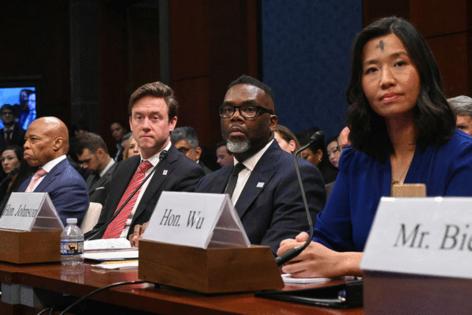Commentary: Sanctuary is good public policy
Published in Op Eds
On March 5, the mayors of Boston, Denver, Chicago and New York were summoned to Congress to justify their cities’ sanctuary status. The mayors’ explanations were interrupted by questions rooted in inaccurate, racist stereotypes about undocumented immigrants, but they stood their ground.
“I am here to make sure that the city of Boston is safe,” said Mayor Michelle Wu. “Others may want to bring hell. We are here to bring peace to cities everywhere.”
As the Trump administration prioritizes mass deportation, it is more important than ever for our local leaders not to yield to intimidation. As part of their efforts to create thriving communities, states, cities and towns should pass explicit sanctuary policies.
Sanctuary refers to a range of local laws and practices, but often includes limits on police cooperation with Immigration and Customs Enforcement, and access to city services regardless of immigration status.
If my seven years of research with women who migrated to the United States for my forthcoming book on immigrant motherhood has taught me anything, it is this: Sanctuary matters. Sanctuary is not perfect. It does not completely shield immigrants from deportation. It draws political backlash. It does not offer a pathway to citizenship. It matters anyway.
First, sanctuary policies make our communities safer. Immigrants, including undocumented people, commit crimes at lower rates than their native-born counterparts. When sanctuary policies are in place, immigrants are more likely to report violent crimes, rather than avoid the police. Immigrants need to know that encounters with police won’t wrench them from their families and communities.
Second, sanctuary policies allow undocumented people to work without immediate fear of deportation. There are an estimated 8.3 million undocumented workers in the United States who collectively contribute nearly $23 billion in Social Security taxes each year. Sanctuary policies allow these undocumented workers to play their vital roles in every corner of our economy with less fear.
One woman I met, Marisol, told me about the fear she lived with after she arrived from El Salvador, fleeing political violence. She imagined being deported back into harm’s way, separated from her children. As she came to understand the protections of the city where she now lived, she sought work at a grocery store. She explained that the city’s sanctuary policies brought “a lot of peace to know that you aren’t protected 100%, but there are people who, if something happens to you, they can do something for you.”
Marisol and her family could have tried to survive on her husband’s income rather than risk family separation, leaving her job unfilled. But the city’s sanctuary policies left her feeling confident she could get to work safely, allowing her to contribute to her family’s financial stability and the local economy.
But this is not just about public safety or economics. Sanctuary policies are about justice and human rights as much as they are about practical benefits.
The terms of the immigration debate have changed, shifting further right and drawing on militant, misleading language of an “ invasion.” Yet, democracies cannot function without attending to fundamental rights to family, opportunity and safety. In offering some protection from the deportation regime, sanctuary cities give immigrants a better chance at caring for their families and contributing to healthy, connected communities.
Some argue that this will only place a target on places that declare sanctuary. But staying quiet won’t deter the juggernaut of anti-immigrant federal action coming our way. As historian Timothy Snyder puts it, “Do not obey in advance.”
The day after the 2024 election, I spoke to my 99-year-old grandmother, who fled the Nazis in 1939. This time, she told me, the government wasn’t coming for the Jews. They were coming for the immigrants. This doesn’t have to be a prophecy. We can refuse to repeat history. And we can start by passing sanctuary policies, in our biggest cities and smallest villages.
_____
Sarah Bruhn received her Ph.D. from Harvard University and is a postdoctoral researcher at the University of Pennsylvania, where she is writing two books about immigrant families. She is a member of the Scholars Strategy Network. This column was produced for Progressive Perspectives, a project of The Progressive magazine, and distributed by Tribune News Service.
____
©2025 Tribune Content Agency, LLC.




























































Comments